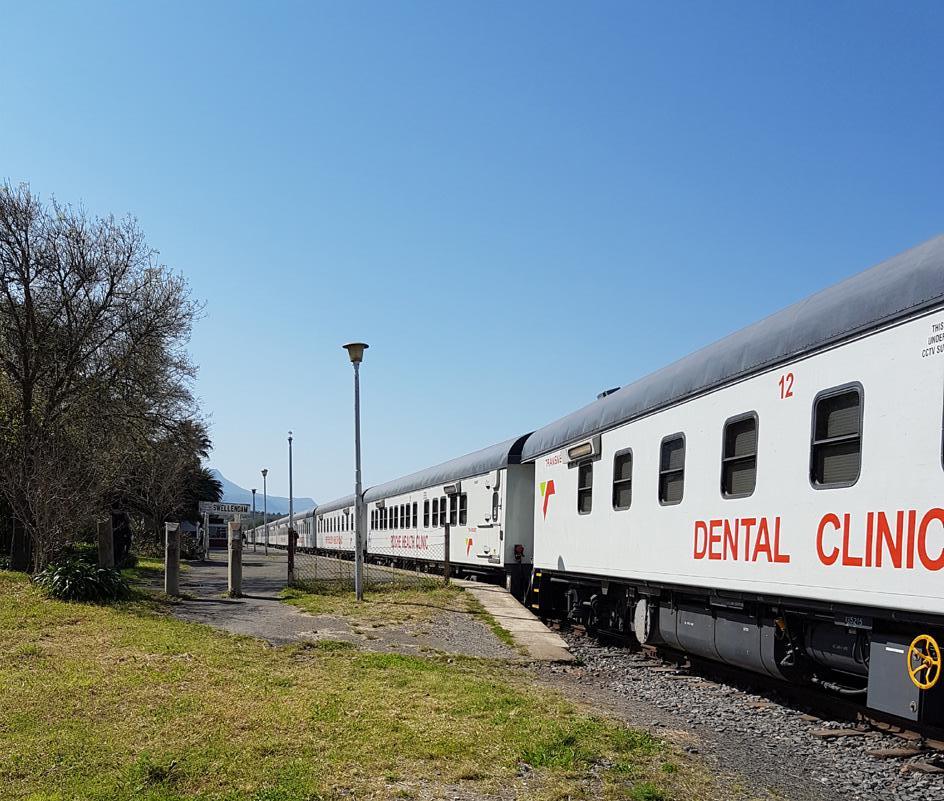
8 minute read
BEST MQOMBOTHI BREWER CROWNED IN SOWETO
Thembisa’s young entrepreneur crowned best mqombothi brewer
by Dumisani Hlatswayo
Advertisement
The best mqombothi brewer has been crowned to celebrate Africa month.
Sibusiso Skhosana (31) from the
Emfihlweni section in Thembisa came out on top walking away with an R5000 cash prize, and a gift voucher from African Brew and Tolokazi.
“I discovered the entrepreneurial qualities at the age of 7 years when I first sold snacks and sweets while I was still in primary school. Throughout my school life I sold almost anything that I could, I didn’t do it for survival but for the love of entrepreneurship,” Sibusiso tells The Olifants.
Sibusiso currently owns three businesses: a brewing beer and cider company, a clothing range, and a hiking and tourism company. He says all his businesses are selffunded, but he is open to funding opportunities.
About being recognised as a king of mqombothi, the ambitious entrepreneur says: “It means more hard work and more education on umqombothi to the youth as there was an article in 2018 stating that umqombothi has become almost one of the extinct African drinks. So, to me, it means that I carry a responsibility to try to save it from being extinct,” he quips.

Sibusiso Skhosana
Sibusiso advises budding entrepreneurs to build a brand before anything else. “It is important to know what you want. Set goals and targets and never be afraid to seek advice and always start small. Understanding your business is also important and always be truthful to your goals. Report back on your failures and most importantly learn from them, they will build your success,” he concludes.
Follow Sibusiso on social media:
Twitter @1632Crafts
Instagram @1632Crafts
Facebook @1632Crafts
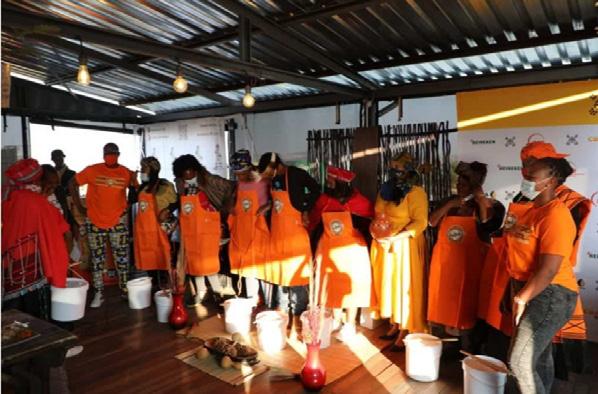
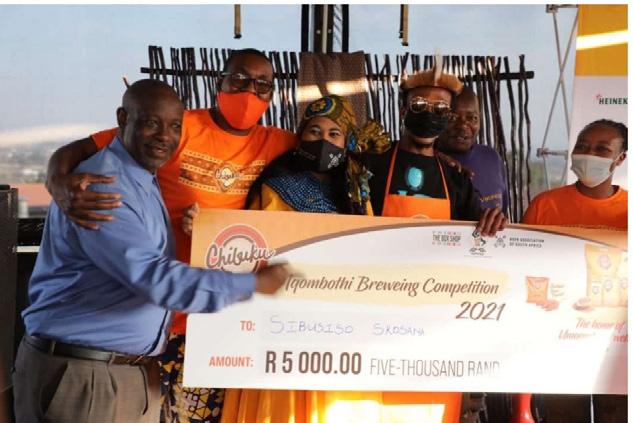
Kushone ababili engozini yemoto netekisi Ingozi
Photo for illustration purposes only
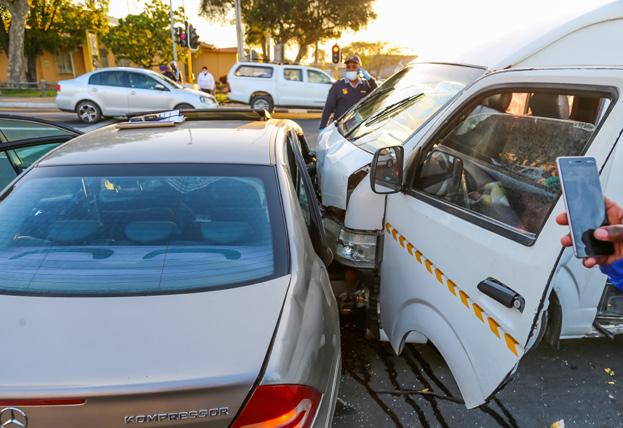
by Staff Writer
Kwenzeke ingozi ehlasimulisa umzimba ezimpambanweni zomgwaqo uAndrew Maphetho no Songo noThembisa lapho kungqubuzana imoto yohlobo lweFord Fiesta netikisi eligcwele abagibeli. Ithimba le-City Emergency lase Commercial Fire Station liphuthume lapho ingozi yenzeke khona ukuzohlangula abangakanyeke engozini.
Ngokwesikhulumeli seDEMS uWilliam Ntladi, uma befika ukuzohlenga abagibeli, owesifazane obekade egibele iFord Fiesta ushonele khona lapho ngemuva kokulimala kakhulu.
“Utholakale asabambeke phakathi kwemoto, abatakuli baze basebenzisa i-Jaws-of-Life ukumkhipha. Nomshayeli we Toyota Quantum utholwe ashonile njengoba naye ubekade ebambeke emotweni,” kuchaza uNtladi. Abagibeli abayishumi nambili baphuthunyiswe esebhedlele, sekwembulwa kwembeswa kubo.
Yenza lokhu okulandelayo ukuze uphephe emgwaqweni:
• Qiniseka ukuthi omoto yakho isezingeni elihle. • Qiniseka ukuthi amathayi akho asengakapheli. • Bheka amathayi akho ukuthi agcwele umoya. • Gwema ukuhamba ngesivinini esikhulu phakathi elokishini. • Uma ungumshayeli wetekisi hlonipha imithetho yendlela • Ungaphuzi noma usebenzise izidakwamizwa uma uyashayela.
Two men arrested men for rape
by Staff Writer
The Ekurhuleni District Zone 1’s Family Violence, Child Protection and Sexual Offences Unit Detectives have on Monday and early this Tuesday arrested two men for the alleged rape of a minor and a 19 year old lady.
One of the suspects, a 31 year old ehailing cab driver was arrested at his home yesterday in connection with a rape incident on Sunday during which the 19 year old, who hailed a taxi, had her destination changed by the driver who took her to his place and allegedly raped her. She managed to gather valuable information which assisted the police officers during their investigation.
The second suspect, a 39 year old salon owner is alleged to have inappropriately touched and kissed a nine year old who was brought to his salon by her mother. The parent’s and suspect’s agreement was that he will escort the little one to cross the road after which the girl will have been in a position to find her way home. Mother left, and the child came back running, telling her mom what had happened.
The two suspects are expected to appear in the Tembisa Magistrate Court to each face a charge of rape.
The Acting station commander of the Ivory Park SAPS, Colonel Baba Mpotoane, has commended the Detectives for their swift follow up and the resultant arrests.
Mazwane Foundation steps in to help poor families
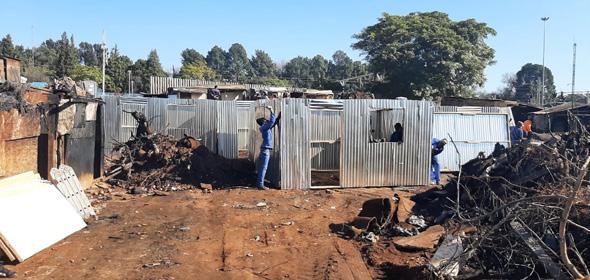
The MaZwane Foundation is looking for partners to assist those families affected by the Kaalfontein fire tragedy that took place on 31 May 2021. We are looking for donations of food, clothing, and blankets which will be distributed by the Foundation to those families in urgent need.
Donations can be dropped off at all Imbizo Shisanyama outlets:
• Busy Corner Imbizo Shisanyama, Ebony Park • Midrand Mall, Halfway House • Mall of Thembisa, Olifantsfontein Rd, Clayville
Contacts: Develd Monyai on 082-617-1110 or Nolwazi Luthuli on 060-318-6262.
Umuntu Ngumuntu Ngabantu
Sex worker: My dream was to become a journo
by Staff Writer
Grace Watu* (29) is a mother of two who makes a living by selling her body for as little as R50 to feed her children. The Ivory Parkbased sex worker says she had to quit school early to make sure her children are fed. Growing up, her dream was to become a qualified journalist but she had to abandon that dream.
Grace has to work despite the risks such as contracting Covid-19 or being robbed by criminals who pretend to be clients. Sex work is still criminalised under the Sexual Offences Act, which means she can be arrested as well.
Currently Grace promotes her services on Facebook and other social media platforms. In one of the posts she wrote: “R50 round, R350 whole night.”
One of the Olifants News’s journalists pretended to be a potential customer and contacted Grace: “I charge R50 per round, R350 for the whole night. You pay when you arrive here. You can come I am in Ivory not far from Afrika,” said the sex worker.
Asked if she is willing to try it without a condom she said: “ I can’t take chances without a condom as there are a lot of STIs. As for Corona you can get it anywhere but I don’t have it,” she said. “Why must I worry that you might have Covid-19 when I should be worried that where I stay I can have it?”
According to sex worker activist organisations, since the beginning of the lockdown last year it has been hard for sex workers like Grace, as most of them couldn’t freely move around.
Grace said if someone offers her a job today she is willing to take it. “Do you think I like what I am doing? Because I don’t have any qualifications, I am willing to take any job. Growing up my dream was to become a journalist,” she revealed.
As unemployment currently stands at 32,6%, more young women are likely to resort to sex work than ten years ago. Even more disturbing, a staggering one in ten university students is likely to sell their bodies to pay for tuition fees and living costs.
* Grace Watu is not her real name.
by Staff Writer
The train will be in Tembisa at the Olifantsfontein station from Monday 07 June 2021 – Friday 18 June 2021. The Transnet-Phelophepa Healthcare Train brings health and hopes to thousands of rural South Africans in need of access to healthcare facilities. The Transnet-Phelophepa Healthcare Train – the world’s first primary healthcare hospital on wheels – uses the existing rail network in South Africa to make quality medical care an accessible reality for many of South Africa’s most remote communities. This nineteen coach train, with its twenty resident staff members, fondly known as the “miracle train”, carries the most modern medical equipment on board. Phelophepa is indeed a journey of hope that continues to make a history of caring. The name ‘Phelophepa’ combines elements of Sotho and Tswana and, roughly translated, means ‘good, clean health’ – which is exactly what this travelling health clinic provides.
The first of our much-loved
Phelophepa Health Trains started operating in 1994. The Phelophepa Health Train has shown incredible growth since its humble beginnings as a three-carriage eye clinic. Today – almost two decades later – it boasts 19 fully refurbished and equipped coaches that provide facilities for health, oral and vision screening programmes, basic health education awareness and community counselling workshops. It won several service excellence awards over the years , amongst those; the United Nations Public Service Award in the ‘Improving Service Delivery’ category in June 2008. Through on-board clinic services and community outreach programmes Phelophepa impacts over 180 000 patients a year.
It travels for 36 weeks each year visiting a different rural community every week or two weeks. This was a significant step forward in the Transnet Foundation’s vision of providing quality healthcare where health services and infrastructure were not fully in place.
The success of the TransnetPhelophepa Healthcare Train, together with the increased demand for healthcare services set in motion plans for another train. That dream became a reality when the second train, Phelophepa II, began operation in March 2012. With both trains operating simultaneously, the extended reach of the primary healthcare offering enables potentially 360 000 patients to receive healthcare they would not have had access to before on an annual basis.
Although the Transnet-Phelophepa Healthcare Trains can only be in an area for a limited time, the goal is to supplement and support existing facilities to make sure the residents can continue benefitting from quality healthcare once the train has departed. Education and empowerment that leave better equipped and informed communities in its tracks is a core value of the Phelophepa programme.
Before the train rolls into town, teams are sent out to alert the community of the days the train will be delivering services. A comprehensive social mobilisation strategy is developed and implemented in collaboration with all local stakeholders in each community.
Relationships are established with the existing healthcare providers so that patients can be referred and continue to receive the care they need.
While the train is in the area, screening and healthcare education are the primary concerns. Nursing teams visit local schools to screen children for health-related problems and educate them about basic healthcare.
